Unit 2 I'll help to clean up the city parks. SectionA 3a-3c课件 (共27张PPT)
文档属性
| 名称 | Unit 2 I'll help to clean up the city parks. SectionA 3a-3c课件 (共27张PPT) | 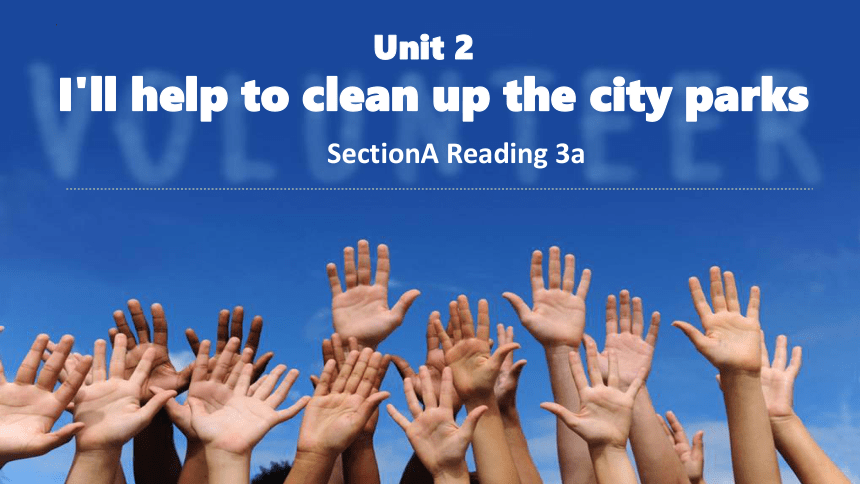 | |
| 格式 | pptx | ||
| 文件大小 | 17.7MB | ||
| 资源类型 | 教案 | ||
| 版本资源 | 人教新目标(Go for it)版 | ||
| 科目 | 英语 | ||
| 更新时间 | 2023-12-24 10:08:43 | ||
图片预览

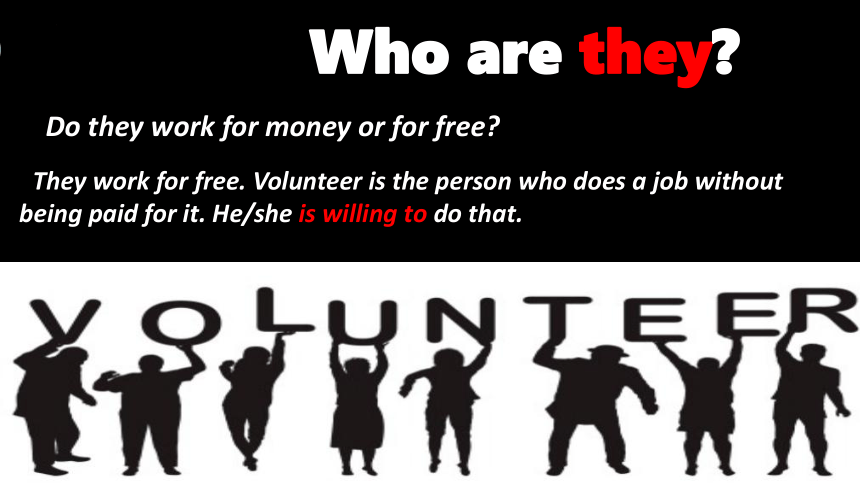
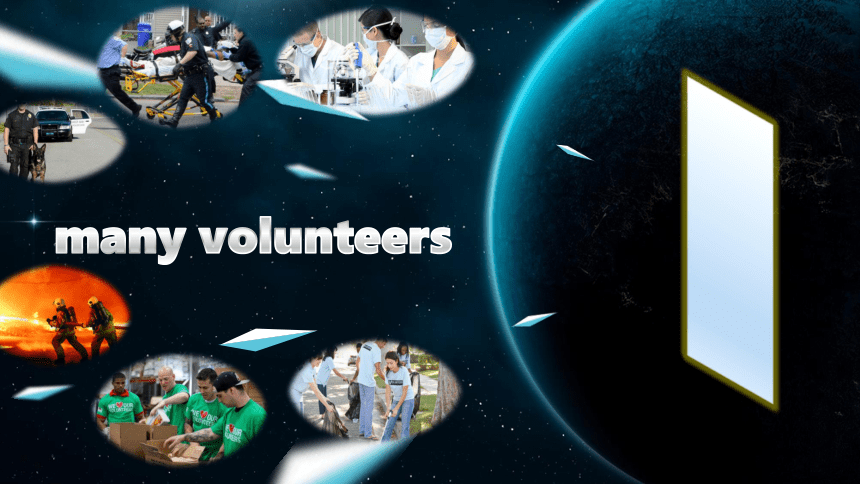
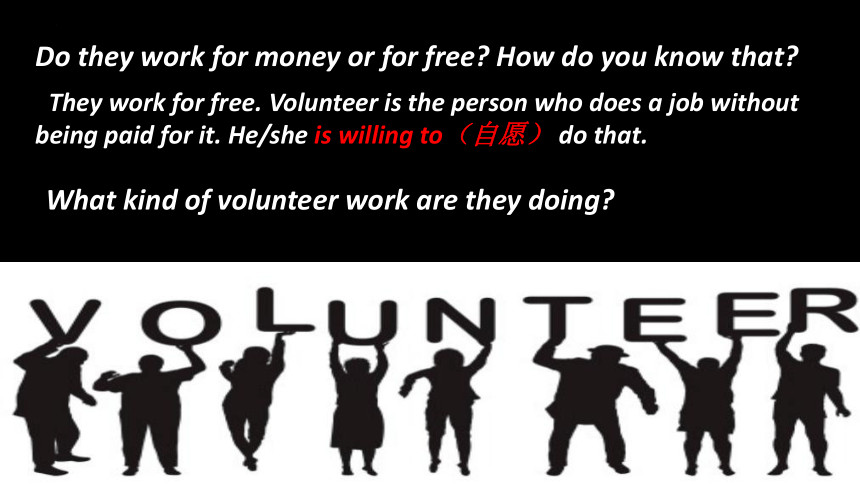
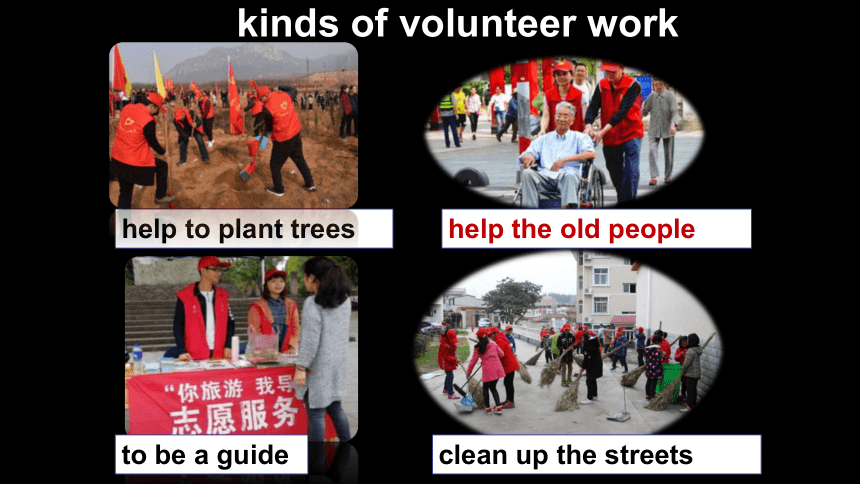
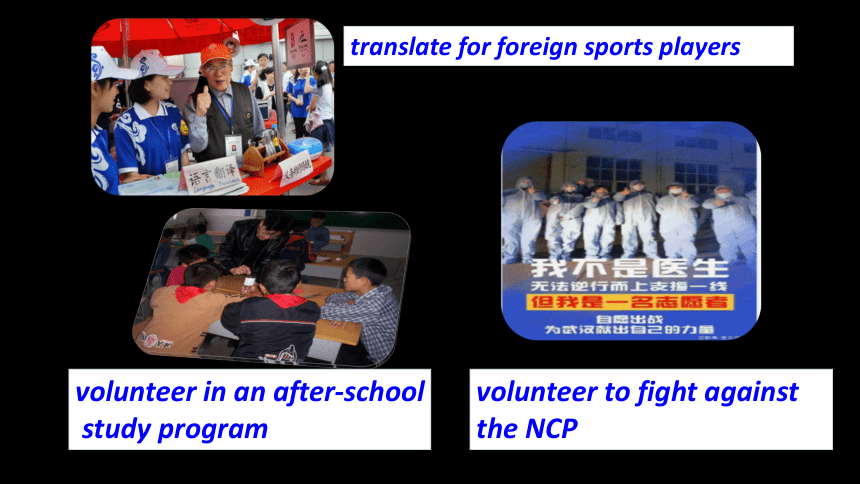
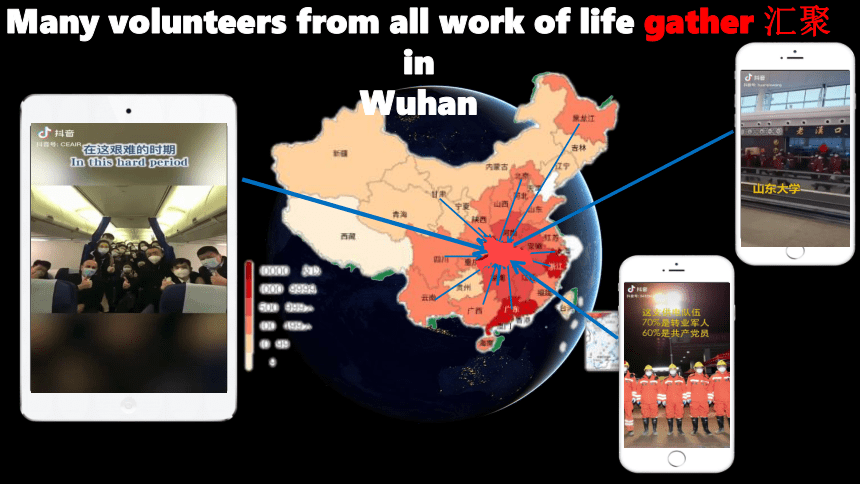
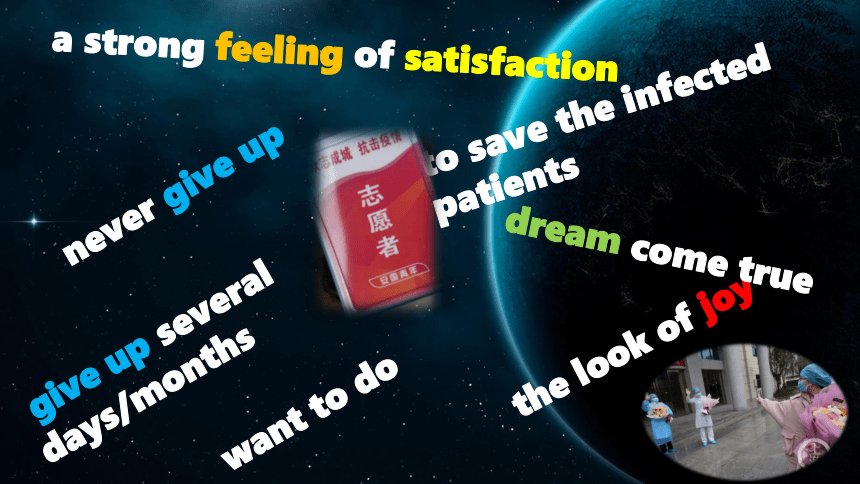
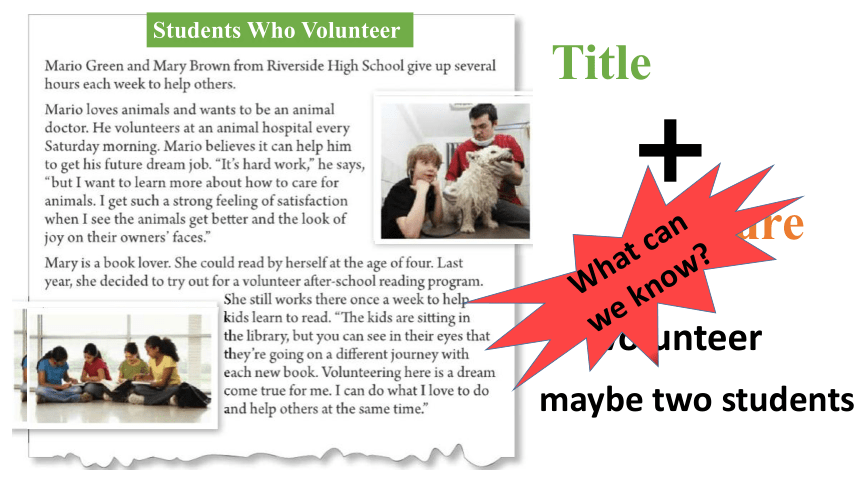
文档简介
(共27张PPT)
I'll help to clean up the city parks
Unit 2
SectionA Reading 3a
Who are they
Do they work for money or for free
a They work for free. Volunteer is the person who does a job without being paid for it. He/she is willing to do that.
many volunteers
Do they work for money or for free How do you know that
What kind of volunteer work are they doing
a They work for free. Volunteer is the person who does a job without being paid for it. He/she is willing to(自愿) do that.
help to plant trees
help the old people
clean up the streets
to be a guide
kinds of volunteer work
volunteer to fight against the NCP
translate for foreign sports players
volunteer in an after-school
study program
Many volunteers from all work of life gather 汇聚 in
Wuhan
never give up
a strong feeling of satisfaction
the look of joy
dream come true
give up several days/months
to save the infected patients
want to do
Students Who Volunteer
Title
Picture
volunteer
maybe two students
What can we know
who
Mary
Mario
Mario is an animal lover.
Mary loves books.
Read the title and first sentence
The title can be helpful for you to understand a text.
It is also a good idea to read the first sentence of each paragraph before you read the whole text.
Translate the underlined sentence into Chinese
Careful reading(para2)
How
does Mario
feel about
volunteering
It is hard work,but
he wants to learn...
And he gets a
strong feeling of
satisfaction when
he sees the animals
get better and the
look of joy on
the owners’ faces.
Why
does Mario
volunteer to
do that
He loves animals
and wants to be
an animal doctor.
What does Mario
volunteer to do
He volunteers at an animal hospital.
What can we learn from this sentence
Volunteering
makes us happy!
当看到动物们(病情)渐好,看到他们主人脸上喜悦的表情时,我产生出一种极强的满足感来。
How
does Mary
feel about
volunteering
What does Mary
volunteer to do
Why
does Mary
volunteer
to do that
She loves books
and could read
well.
She volunteers at an
after-school reading
program for kids.
/ pr ɡr m/
She enjoys helping
kids learn to read.
It is a dream come
true for her, and
she can do what
she loves to do and
help others at the
same time.
come true:实现,
修饰dream
Volunteering
achieves(成就) us!
Translate the underlined sentence into Chinese
Careful reading(para3)
Finish Mario's and Mary's Volunteer ID card.
Name:_______________
Loves:_______________
Workplace:___________
Time:_________________
Reason:_______________
______________________
Ideas/ Feelings:_________
__________________________________________________________________
Name:_______________
Loves:_______________
Workplace:___________
Time:_________________
Reason:_______________
______________________
Ideas/ Feelings:_________
__________________________________________________________________
Mario
Mary
an animal hospital
every Saturday morning
getting my future dream job.
get a strong feeling of satisfaction
at an after-school reading program
once a week
doing what I love to do and help others
a dream come true
books
animals
who
what
where
when
why
how
Mario
Mary
animals
books
an animal hospital
reading program
every Saturday morning
once a week
getting a future
dream job.
doing what I love to do
and help others
learn how to care for animals
get a strong feeling of satisfaction
a dream come true
Retelling
dream
dream
Some people think students should be busy with their lessons. They should concentrate more on their studies. volunteering to help others is a waste of time. What do you think of volunteering
Thinking
Volunteering can help you make friends; learn new skills, advance your career; and even feel happier and healthier. Learn how to find the right fit. Here are some benefits about volunteering.
Volunteering connects you to others. Volunteering is a great way to meet new people, especially if you are new to an area. It strengthens your ties to the community and broadens your support network, exposing you to people with common interests, neighborhood resources, and fun and fulfilling activities.
Volunteering is good for your mind and body.Volunteering makes you happy.Being helpful to others delivers great pleasure. Volunteering increases self-confidence. You are doing good for others Your role as a volunteer can also give you a sense of pride . Volunteering helps you stay healthy. Studies have found that those who volunteer have a lower mortality rate(死亡率) than those who do not.That is because volunteering can reduce the risk of heart disease and high blood pressure.
Volunteering can advance your career. If you’re considering a new career, volunteering can help you get experience in your area of interest and meet people in the field.Volunteering gives you the chance to practice important skills, such as teamwork, communication(交流), problem solving, organization and so on. You might feel more comfortable at work once you’ve got these skills in a volunteer position (位置)first.
Volunteering brings fun and satisfaction to your life. Doing volunteer work you find meaningful and interesting can be a relaxing escape from your day-to-day routine of work, Volunteering also provides you with new creativity that can carry over into your personal and professional life.
Let’s read and finish the tasks.
What’s the article mainly talking about
/What’s the best title
Benefits of volunteering./
Volunteering and its benefits./...
How many benefits are mentioned in this passage
4/Four
How do you understand the sentence: Those who volunteer have a lower mortality rate(死亡率) than those who do not.
That is because volunteering can reduce the risk of heart disease and high blood pressure.
Translate the underlined sentence into Chinese
志愿工作使你有机会锻炼重要的技能,如团队合作、沟通能力、解决问题的能力、组织能力等 。
Thank you!
Language
Points
each/every
1. Mario Green and Mary Brown from Riverside High School give up several hours each week to help others.
2. He volunteers at an animal hospital every Saturday morning.
“每个”, “一切的”
不同:
each强调个性,着眼于整体中的个体。
every强调共性,着眼于整体。
each可用形容词和代词,而every只用作形容词:
He gave two to each (person).
We have every reason to believe that
the operation will be a success.
我们完全有理由相信手术会取得成功
2. …but I want to learn more about how to care for animals. 但是我想学习更多关于如何照顾动物的事。
特殊疑问词+ to不定式,构成复合不定式结构。
e.g. They don’t know where to build the new house.
=They don’t know where they can build the new house.
他们不知道在哪里可以建新房。
3. I get such a strong feeling of satisfaction when I see the animals get better and the look of joy on their owners’ faces. 当我看到动物们渐好,看到它们主人脸上喜悦的表情时,我产生出那么一种极强的满足感来。
第一个get的意思是“产生;形成”,为及物动词,常与feeling,idea等词搭配使用。
第二个get是系动词,后接形容词,表示体质、情绪、天气等方面的改变,通常译作“变得;成为”。
Do you get the feeling that we’re not welcome here
He got angry with me after that.
eg:
4. Last year, she decided to try out for a volunteer after-school reading program.
去年,她决定参加一个课外阅读项目的志愿者选拔。
句中try out for是一个短语动词,意为“报名参加选拔;申请参选(某项活动)为其中一员”。例如:
Why did you decide to try out for the Olympics 你为什么要报名参选奥运会?
PS:try out, “试验;尝试检验”。例如:
They’re trying out a new farming method.
Volunteering here是动名词短语做主语。例如:
Playing football is fun for me.
踢足球对我来说很有趣。
Riding bicycle helps us to keep healthy.
骑车可以帮助我们保持健康。
6. Volunteering here is a dream come true for me.
在这里当志愿者对我来说是梦想成真。
a dream come true表示“梦想成为现实;梦想成真”
7. I can do what I love to do and help others at the same time. 我可以做我所喜欢的事情,同时还可以帮助他人。
从句what I love to do在句子中作do的宾语。
【即学即练】
I don’t know ____________(该做什么)next.
You can ask Mr Zhang ____________(到哪里)to get the information you need.
what to do
where to go
Fill in the blanks using the words in the box.
Exercises
several, feeling, owner, journey, satisfaction
1. I only want to sleep for _______ minutes.
2. The _______ from London to Oxford takes about an hour and a half.
journey
several
3. The next morning, the _____ of the house prepared the breakfast for us.
4. He looked at his work with a smile of __________.
5. She enjoys the _______ of freedom.
owner
satisfaction
feeling
Complete the sentences.
1. My brother wants _____ (be) a pilot.
2. You’ll never learn ______ (ride) a bike if you don’t practice.
3. Mike taught his grandpa how _____ (use) the computer.
to ride
to be
to use
Exercises
4. Mr. Smith helped the young man ______ (find) a job.
5. The students decided _______ (work) out the problem by themselves.
6. He volunteers _______ (work) on the farm.
to find
to work
to work
I'll help to clean up the city parks
Unit 2
SectionA Reading 3a
Who are they
Do they work for money or for free
a They work for free. Volunteer is the person who does a job without being paid for it. He/she is willing to do that.
many volunteers
Do they work for money or for free How do you know that
What kind of volunteer work are they doing
a They work for free. Volunteer is the person who does a job without being paid for it. He/she is willing to(自愿) do that.
help to plant trees
help the old people
clean up the streets
to be a guide
kinds of volunteer work
volunteer to fight against the NCP
translate for foreign sports players
volunteer in an after-school
study program
Many volunteers from all work of life gather 汇聚 in
Wuhan
never give up
a strong feeling of satisfaction
the look of joy
dream come true
give up several days/months
to save the infected patients
want to do
Students Who Volunteer
Title
Picture
volunteer
maybe two students
What can we know
who
Mary
Mario
Mario is an animal lover.
Mary loves books.
Read the title and first sentence
The title can be helpful for you to understand a text.
It is also a good idea to read the first sentence of each paragraph before you read the whole text.
Translate the underlined sentence into Chinese
Careful reading(para2)
How
does Mario
feel about
volunteering
It is hard work,but
he wants to learn...
And he gets a
strong feeling of
satisfaction when
he sees the animals
get better and the
look of joy on
the owners’ faces.
Why
does Mario
volunteer to
do that
He loves animals
and wants to be
an animal doctor.
What does Mario
volunteer to do
He volunteers at an animal hospital.
What can we learn from this sentence
Volunteering
makes us happy!
当看到动物们(病情)渐好,看到他们主人脸上喜悦的表情时,我产生出一种极强的满足感来。
How
does Mary
feel about
volunteering
What does Mary
volunteer to do
Why
does Mary
volunteer
to do that
She loves books
and could read
well.
She volunteers at an
after-school reading
program for kids.
/ pr ɡr m/
She enjoys helping
kids learn to read.
It is a dream come
true for her, and
she can do what
she loves to do and
help others at the
same time.
come true:实现,
修饰dream
Volunteering
achieves(成就) us!
Translate the underlined sentence into Chinese
Careful reading(para3)
Finish Mario's and Mary's Volunteer ID card.
Name:_______________
Loves:_______________
Workplace:___________
Time:_________________
Reason:_______________
______________________
Ideas/ Feelings:_________
__________________________________________________________________
Name:_______________
Loves:_______________
Workplace:___________
Time:_________________
Reason:_______________
______________________
Ideas/ Feelings:_________
__________________________________________________________________
Mario
Mary
an animal hospital
every Saturday morning
getting my future dream job.
get a strong feeling of satisfaction
at an after-school reading program
once a week
doing what I love to do and help others
a dream come true
books
animals
who
what
where
when
why
how
Mario
Mary
animals
books
an animal hospital
reading program
every Saturday morning
once a week
getting a future
dream job.
doing what I love to do
and help others
learn how to care for animals
get a strong feeling of satisfaction
a dream come true
Retelling
dream
dream
Some people think students should be busy with their lessons. They should concentrate more on their studies. volunteering to help others is a waste of time. What do you think of volunteering
Thinking
Volunteering can help you make friends; learn new skills, advance your career; and even feel happier and healthier. Learn how to find the right fit. Here are some benefits about volunteering.
Volunteering connects you to others. Volunteering is a great way to meet new people, especially if you are new to an area. It strengthens your ties to the community and broadens your support network, exposing you to people with common interests, neighborhood resources, and fun and fulfilling activities.
Volunteering is good for your mind and body.Volunteering makes you happy.Being helpful to others delivers great pleasure. Volunteering increases self-confidence. You are doing good for others Your role as a volunteer can also give you a sense of pride . Volunteering helps you stay healthy. Studies have found that those who volunteer have a lower mortality rate(死亡率) than those who do not.That is because volunteering can reduce the risk of heart disease and high blood pressure.
Volunteering can advance your career. If you’re considering a new career, volunteering can help you get experience in your area of interest and meet people in the field.Volunteering gives you the chance to practice important skills, such as teamwork, communication(交流), problem solving, organization and so on. You might feel more comfortable at work once you’ve got these skills in a volunteer position (位置)first.
Volunteering brings fun and satisfaction to your life. Doing volunteer work you find meaningful and interesting can be a relaxing escape from your day-to-day routine of work, Volunteering also provides you with new creativity that can carry over into your personal and professional life.
Let’s read and finish the tasks.
What’s the article mainly talking about
/What’s the best title
Benefits of volunteering./
Volunteering and its benefits./...
How many benefits are mentioned in this passage
4/Four
How do you understand the sentence: Those who volunteer have a lower mortality rate(死亡率) than those who do not.
That is because volunteering can reduce the risk of heart disease and high blood pressure.
Translate the underlined sentence into Chinese
志愿工作使你有机会锻炼重要的技能,如团队合作、沟通能力、解决问题的能力、组织能力等 。
Thank you!
Language
Points
each/every
1. Mario Green and Mary Brown from Riverside High School give up several hours each week to help others.
2. He volunteers at an animal hospital every Saturday morning.
“每个”, “一切的”
不同:
each强调个性,着眼于整体中的个体。
every强调共性,着眼于整体。
each可用形容词和代词,而every只用作形容词:
He gave two to each (person).
We have every reason to believe that
the operation will be a success.
我们完全有理由相信手术会取得成功
2. …but I want to learn more about how to care for animals. 但是我想学习更多关于如何照顾动物的事。
特殊疑问词+ to不定式,构成复合不定式结构。
e.g. They don’t know where to build the new house.
=They don’t know where they can build the new house.
他们不知道在哪里可以建新房。
3. I get such a strong feeling of satisfaction when I see the animals get better and the look of joy on their owners’ faces. 当我看到动物们渐好,看到它们主人脸上喜悦的表情时,我产生出那么一种极强的满足感来。
第一个get的意思是“产生;形成”,为及物动词,常与feeling,idea等词搭配使用。
第二个get是系动词,后接形容词,表示体质、情绪、天气等方面的改变,通常译作“变得;成为”。
Do you get the feeling that we’re not welcome here
He got angry with me after that.
eg:
4. Last year, she decided to try out for a volunteer after-school reading program.
去年,她决定参加一个课外阅读项目的志愿者选拔。
句中try out for是一个短语动词,意为“报名参加选拔;申请参选(某项活动)为其中一员”。例如:
Why did you decide to try out for the Olympics 你为什么要报名参选奥运会?
PS:try out, “试验;尝试检验”。例如:
They’re trying out a new farming method.
Volunteering here是动名词短语做主语。例如:
Playing football is fun for me.
踢足球对我来说很有趣。
Riding bicycle helps us to keep healthy.
骑车可以帮助我们保持健康。
6. Volunteering here is a dream come true for me.
在这里当志愿者对我来说是梦想成真。
a dream come true表示“梦想成为现实;梦想成真”
7. I can do what I love to do and help others at the same time. 我可以做我所喜欢的事情,同时还可以帮助他人。
从句what I love to do在句子中作do的宾语。
【即学即练】
I don’t know ____________(该做什么)next.
You can ask Mr Zhang ____________(到哪里)to get the information you need.
what to do
where to go
Fill in the blanks using the words in the box.
Exercises
several, feeling, owner, journey, satisfaction
1. I only want to sleep for _______ minutes.
2. The _______ from London to Oxford takes about an hour and a half.
journey
several
3. The next morning, the _____ of the house prepared the breakfast for us.
4. He looked at his work with a smile of __________.
5. She enjoys the _______ of freedom.
owner
satisfaction
feeling
Complete the sentences.
1. My brother wants _____ (be) a pilot.
2. You’ll never learn ______ (ride) a bike if you don’t practice.
3. Mike taught his grandpa how _____ (use) the computer.
to ride
to be
to use
Exercises
4. Mr. Smith helped the young man ______ (find) a job.
5. The students decided _______ (work) out the problem by themselves.
6. He volunteers _______ (work) on the farm.
to find
to work
to work
同课章节目录
- Unit 1 What's the matter?
- Section A
- Section B
- Unit 2 I'll help to clean up the city parks.
- Section A
- Section B
- Unit 3 Could you please clean your room?
- Section A
- Section B
- Unit 4 Why don't you talk to your parents?
- Section A
- Section B
- Unit 5 What were you doing when the rainstorm came
- Section A
- Section B
- Review of Units 1-5
- Unit 6 An old man tried to move the mountains.
- Section A
- Section B
- Unit 7 What's the highest mountain in the world?
- Section A
- Section B
- Unit 8 Have you read Treasure Island yet?
- Section A
- Section B
- Unit 9 Have you ever been to a museum?
- Section A
- Section B
- Unit 10 I've had this bike for three years.
- Section A
- Section B
